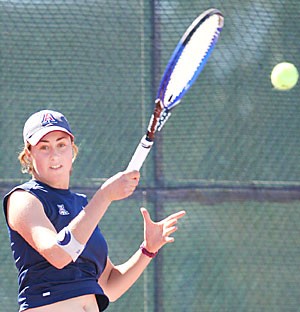Imagine you’ve just graduated high school and join the army willingly, without a second guess. Not likely the scenario for a typical American teenage athlete fresh from graduation, but that was exactly where 21-year-old freshman Danielle Steinberg of the Arizona women’s tennis team found herself.
As an Israeli, Steinberg enlisted in the Israeli Defense Forces, which requires all Israeli citizens to join once they turn 18 after completing secondary school.
The IDF is mandatory unless there is a physical condition or a mental illness that would prevent someone from being able to perform the necessary duties, Steinberg said.
“”It’s a part of Israeli life and wasn’t anything that was different for me,”” said Steinberg. “”Just another stage in life.””
Israeli men and women are involved for three years of combat service, and women with non-combat duties serve just two.
Steinberg said she noticed the most change during the beginning of her new lifestyle.
“”The first couple of months were just training, so I was like every other soldier,”” Steinberg said. Once she successfully completed that section, Steinberg was moved to her job, where she was in charge of paperwork on a base, she said.
Not every female involved in the IDF gets that type of job. Being an athlete, Steinberg said she received extra special conditions.
That was an honor in itself because, “”two athletes from each sport from every year get special conditions … based on rankings and results,”” Steinberg said.
By being ranked No. 1 for juniors under 18, Steinberg said she was able to cash in on the treatment.
During her service, Steinberg wasn’t able to compete in as many tournaments as she would have liked, but the special conditions allotted time for her to practice every day, meaning that she would have to wake up extra early to get tennis time into her regimented schedule.
This was a complete change, since tennis had been a part of her life since the early age of 8 years old.
Even with the exclusive treatment, her service still put a damper on her tennis career.
“”It held me back because I couldn’t practice as much as I wanted to, and I couldn’t travel because I couldn’t get as many days off,”” Steinberg said. “”I would have played more tournaments if I wasn’t in the army.””
Two years after her service, Steinberg had decided that she wanted to compete at the collegiate level. It wasn’t hard finding schools that would accept her, as she was ranked No. 5 for women in Israel.
Ultimately it was the attitudes of Arizona women’s tennis head coach Vicky Maes and assistant coach Brian Ramirez that convinced Steinberg to chose Arizona.
“”I felt like they really wanted me, and the athletic department is really good here, and the conditions are amazing,”” she said.
The transition to American culture came rather quickly, Steinberg said, as she is finding herself adapting with no problems.
“”The first week I was shocked and walking with my eyes open,”” she said. “”But then everyone treated me like family here, and I guess because most girls are foreigners on the team, we are all each other’s family, so it made the transition easier.””
Coming to Tucson and playing tennis as a team sport is new for Steinberg. Now she finds herself cheering and supporting her teammates as opposed to the competitive nature she had against her opponents in Israel.
“”The girls I practice with, I want them to do good, and in Israel it was never like that or any other place where there’s competition, because I always wanted to do better than my opponent,”” Steinberg said.
Not only is she fitting right in; the team voted Steinberg to be one of their captains for this year despite her freshman standing.
“”It’s a compliment to be named captain,”” Steinberg said. “”I always felt that I was a leader by example. I think it’s a label we get, (but) every girl on the team has contributed in their own way. Just because I’m a captain doesn’t mean I’m different.””
That type of attitude has helped lift the No. 46 Wildcats (7-0) to their best start since 1985. Her support for the team doesn’t stop with the leadership role she is carrying, as she also is playing in the No. 2 spot where Maes said she is “”not only winning but completely dominating.””
Although Steinberg said she feels she has successfully transitioned from one culture to another, there are still some noticeable differences, as many American students have never served for their country.
“”I definitely can see a difference between a 21-year-old Israeli person and a 21-year-old American person,”” Steinberg said. “”We are much more mature.””









